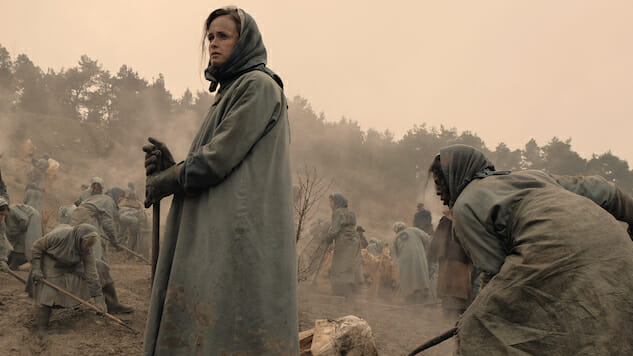“Unwomen” Features The Handmaid’s Tale‘s First, Terrifying Glimpse of the Colonies
(Episode 2.02)
Photo: George Kraychyk/Hulu TV Reviews The Handmaid's Tale
You know the regime is off its hinges when they send Marisa Tomei to a post-apocalyptic wasteland to die.
“Unwomen” alternates between the Colonies, where “unwomen” (lesbians, defiant Handmaids, the infertile of low economic status, sex workers, collaborators against the republic—you know, “undesirables”) are sent to perform brutal manual labor in a vain attempt to re-fertilize (see?) poisoned soil, ground more barren than any Commander’s wife and probably more dangerous too, as the contamination is bad enough that the mortality rate from pulmonary disease, weird fevers and festering sores is approximately 100%… and the abandoned building (I think it’s a Boston Globe office?) where Offred (Elisabeth Moss) waits, and waits, and waits, and waits, while cells multiply in her belly and someone, maybe, is coming to get her out of Gilead.
In the Colonies, death isn’t an “if,” it’s a “when.” For Offred, there’s nothing but a million miles of “if” — a gestating baby in a world of high failure rates for healthy live births; lingering conflict over her feelings for Nick (Max Minghella) in light of the seemingly-ages-ago message that her husband might be alive; the knowledge that the Waterfords have a lot of resources and will stop at nothing to find her; and never knowing whom she can truly trust.
Pitchforks hit barren dust. A hammer idly rattles across a brick wall.
Emily (Alexis Bledel), once known as Ofglen the First, has been sent to the Colonies after her high-bravado and extremely gory murder of a Guardian in Season One. As the resident scientist she is now Florence Nightingale to a cadre of total lost causes, but she’s trying.
Offred, once and currently known as June Osborne, haunts the halls of journalism like a melancholy poltergeist, driven by the life inside her and the imagined lives of the people who worked in this building before it became a mausoleum: There’s a high-heeled shoe, left where it fell when some woman was dragged away; cubicles still festooned with family snaps and Fenway parking passes and coffee mugs. Not an Unwoman (an ultra-woman, really) but certainly an Un-Handmaid, June’s solitary confinement in a ruin of the free press is every bit as much a race against time as the lives of the women wasting and dying in the Colonies. She flips on the light over the printing press. You’re expecting a news artifact—what were they putting to bed when Gilead came for them? Instead, there’s a row of nooses, and bullet-pocked concrete walls still faintly stained with blood, and the mate to that shoe. (Yes, sometimes the other shoe drops—literally).
Tomei’s character is… different. She’d been a Commander’s wife who fell in love with someone else. “I was against the university purges, you know,” she says. “I had an MFA in interior design.”
“Is that why you’re here?” Emily says sardonically. But she gives the new death-row inmate medicine.
“Why are you doing this?”
“My mistress was kind to me… once,” Emily replies. The former Commander’s wife doesn’t realize until it’s too late that those pills are not expired antibiotics. There. Will. Be. Consequences.
There’s sweaty toil and sweaty sex. There’s waiting to die and waiting to live. There is violence against women by men, but it’s violence against women by women that ends up being truly unforgivable.
June tries to leave, but she knows she can’t do it alone. Instead, she collects artifacts from the abandoned cubicles and makes an altar.
Amy Glynn is a poet, essayist and fiction writer who really likes that you can multi-task by reviewing television and glasses of Cabernet simultaneously. She lives in the San Francisco Bay Area.